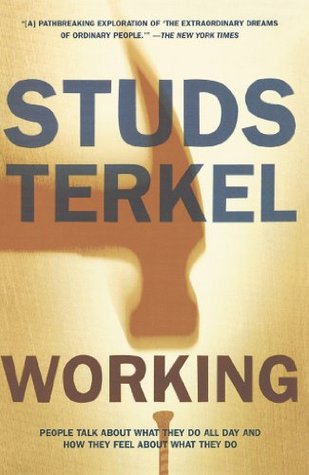More on this book
Community
Kindle Notes & Highlights
by
Studs Terkel
Started reading
June 26, 2018
This book, being about work, is, by its very nature, about violence—to the spirit as well as to the body.
a sort of life rather than a Monday through Friday sort of dying.
just to break the monotony. You want quittin’ time so bad.”
the planned obsolescence of people that is of a piece with the planned obsolescence of the things they make. Or sell.
In lancing an especially obstinate boil, it is not the doctor who experiences the pain.)
“I realized quite early in this adventure that interviews, conventionally conducted, were meaningless. Conditioned clichés were certain to come. The question-and-answer technique may be of some value in determining favored detergents, toothpaste and deodorants, but not in the discovery of men and women.”7 There were questions, of course. But they were casual in nature—at the beginning: the kind you would ask while having a drink with someone; the kind he would ask you. The talk was idiomatic rather than academic. In short, it was conversation.
Most of us, like the assembly line worker, have jobs that are too small for our spirit. Jobs are not big enough for people.”
I was constantly astonished by the extraordinary dreams of ordinary people.
I got chewed out by my foreman once. He said, “Mike, you’re a good worker but you have a bad attitude.” My attitude is that I don’t get excited about my job.
Picasso can point to a painting. What can I point to? A writer can point to a book. Everybody should have something to point to.
This isn’t unusual. People will bug you. You fend it off as much as you can with your mouth and when you can’t, you punch the guy out.
Yet you want your kid to be an effete snob? Yes. I want my kid to look at me and say, “Dad, you’re a nice guy, but you’re a fuckin’ dummy.” Hell yes, I want my kid to tell me that he’s not gonna be like me . .


